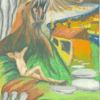Questions for Christmas
(pdf version Happy Holidays)
Q: Which philosophical description of “happy” best describes a modern Happy Holiday experience.
- what I experience here and now
- overall appreciation of one’s life as-a-whole
- the experience of joy, contentment, combined with a sense that one’s life is good, meaningful, and worthwhile
- human flourishing or prosperity
Root of the word Holiday(s), originally the word holiday meant a holy day free from labor and toil. Root word for Happy: Hap – Luck, virtue circumstance.
- Q: To wish “Happy Holidays” (Happy Holy Day) on someone was to bestow luck or divine favor from the first night of Advent through the Feast of the Epiphany, including Christmas.
Q: Which term(s) do you use to describe your personal wishes for the winter holiday season?
| Happy Holidays(s) | Merry Christmas! | Best Wishes | Season’s Greetings |
| Happy New Year | Happy Solstice | Good Yule | Happy Festivus |
| Happy Hannukah | Happy Christmas | Merry Christmahanukwanzaa! | Feliz Navidad |
Americans throw away an extra five trash bags of waste over Christmas, which amounts to 25 million tons of garbage.
- Q: How do you plan to reduce waste during the Happy Holiday season?
Q: What is your happiest holiday experience so far?
Q: Which of all observed holidays is the happiest of all?
Until 1690 people believed happiness was obtained through luck or virtue or divine favor. Then, philosopher John Locke proclaimed, “The necessity of pursuing happiness is the foundation of liberty,” which became a foundation of the Declaration of Independence.
- Q: Is the pursuit of happiness bestowed upon us or obtainable completely under our own control?
Q: What do you think would happen if the Grinch really stole Christmas?
Q: Which 3 are most important to a successful Happy Holiday?
| Friends | Food | Weather | Drink | Gift Giving | Gift Getting |
| Location | Relatives | Shopping | Conversation | Greeting Card | Decorations |
By Pat Kelley November 2018 scissorcraft.com


